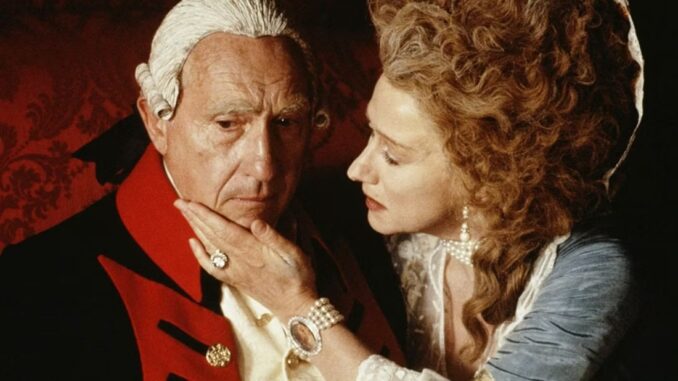
While Netflix has had a few massive hits in the wake of The Crown ending and Stranger Things preparing for its final run, Bridgerton quickly stood out as the streamer’s next property capable of becoming a cultural touchstone for an entire generation of viewers. Bridgerton’s popularity grew so immense compared to other popular drama shows that Netflix had enough confidence to develop the spin-off series Queen Charlotte: A Bridgerton Story, which focused on the courtship between a young Charlotte (India Amarteifio) and King George III (Corey Mylchreest). While it’s a charming alternate version of history that is certainly geared towards those that already love the Bridgerton style and universe, the 1994 Oscar-nominated dramedy The Madness of King George offered a more realistic interpretation of England’s Regency Crisis.
Although he is a figure whose reign is critical to the political development of England and the United States, King George III hasn’t necessarily been given a whole lot of respect in his screen depictions. The Emmy award winning HBO miniseries John Adams characterized him as a ruthless, cruel leader who waged war against the American colonies out of spite, and he was depicted as a petty fool (played by Jonathan Groff) in the Tony award-winning musical Hamilton. However, Nigel Hawthorne’s more earnest depiction of King George III offered a more well-developed depiction of one of British history’s most enigmatic figures. Hawthorne’s performance would go on to earn a Best Actor nomination at the Oscars. While he did not take home the golden statue, the movie won the Oscar in the Best Art Direction category at the 67th Academy Awards ceremony.
What Is ‘The Madness of King George’ About?

Set a decade after the United States of America officially declared independence from Great Britain during the Revolutionary War, The Madness of King George examines the Regency Crisis that called for England to have a new form of leadership. Despite inheriting the throne from a young age, George III’s mental health is considered to be in decline after he shows frequent signs of not being entirely aware of what is going on. While his wife Charlotte (Helen Mirren in an Oscar-nominated performance) desperately tries to give him the support that he needs in order to keep the country together, George III’s rule is challenged by his son, George (Rupert Everett), the Prince of Wales. George has the support of Charles James Cox (Jim Carter), a powerful member of Parliament’s Opposition Party who favors more open relationships with the United States and the abolition of the slave trade. This leads to a conflict with the Tory Prime Minister William Pitt the Younger (Julian Wadham), who wants to use George III’s remaining influence to maintain the status quo.
The Madness of King George III isn’t just a recounting of historical facts, but a compelling examination of how the responsibilities of political office can trigger familial dysfunction. The core issue that the younger George has in the film is that he is unable to believe in George III as a potential ruler, despite his personal love for him as a father. Charlotte is similarly in an awkward position in which she must appease her husband’s idiosyncrasies without ever letting him show true signs of his “madness” in public; it gets to the point where covering up for George III’s blunders becomes detrimental to the health of the nation. Although the minutiae of which political party and royal family is supporting each candidate may be confusing for those without an excessive knowledge of how the British Parliamentary system works, there’s a clever commentary on familial dysfunction that makes The Madness of King George much more approachable for average viewers.
‘The Madness of King George’ Is a Biting Political Satire
The brilliance of The Madness of King George is that it exposes how selfish, ruthless, and ultimately childish politicians really are, as George III’s health sadly sees him become a laughingstock. It’s more than evident that this man who breaks out into impromptu songs and somehow recounts wild facts about his nation’s history is not in any way suited to be ruling. However, it does become unnerving when thinking about what could happen should one of his more ambitious successors manage to take hold of the office. While The Madness of King George is certainly critical of the monarchy, it also argues that any form of concentrated power is privy to corruption.
The Madness of King George is also a fairly groundbreaking examination of mental health, arguing that even those in the highest office need the support of professionals that can give them adequate treatment. George III’s allies do him a disservice by trying to ignore the obvious signs that he is not in control of his thoughts, and push back against anyone who dares to question them as being disloyal.